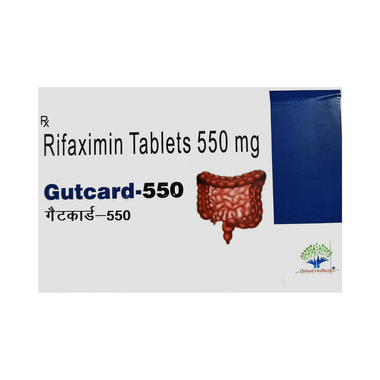-
Rifasmart 550 Tablet (Rs.417.18)
Composition: Rifaximin (550mg)
-
Rifastop 550mg Tablet (Rs.458.9)
Composition: Rifaximin (550mg)
-
Rifabact 550mg Tablet (Rs.609.38)
Composition: Rifaximin (550mg)
-
Rifanil 550 Tablet (Rs.576.5)
Composition: Rifaximin (550mg)
-
Rifapill 550mg Tablet (Rs.398.44)
Composition: Rifaximin (550mg)
-
Xifarix 550 Tablet (Rs.482.3)
Composition: Rifaximin (550mg)
-
Riffy 550 Tablet (Rs.465.9)
Composition: Rifaximin (550mg)
-
Hapigut 550 Tablet (Rs.496.8)
Composition: Rifaximin (550mg)
-
Nordys 550mg Tablet (Rs.440.6)
Composition: Rifaximin (550mg)
All Details About Gutcard 550 Tablet
Find out detailed description, uses, directions of use, side effects, warnings and precautions, frequently asked questions about Gutcard 550 Tablet
Description:
Gutcard 550 Tablet is an antibiotic that treats hepatic encephalopathy, a condition in which the liver fails to remove harmful toxins from the blood, leading to brain damage. It is also used to treat infectious diarrhea. It works by killing and stopping the growth of harmful bacteria in the intestines.This medicine can be used alone or in combination with other medicines. It may be taken with or without food, preferably at the same time, each day. It should be used in the dose and duration as advised by the doctor. Take it at the same time each day to get the most benefit and you should keep on taking this medicine for as long as you are prescribed. Stopping it early may make the infection to come back and harder to treat.
Some people may develop side effects like vomiting, headache, dizziness, nausea, rashes, joint pain, and depression. These side effects are usually temporary and go away during treatment as your body adjusts to the medicine. Consult your doctor if these side effects bother you or will not go away. Your urine may become reddish in color due to this medicine. But, it is normal and harmless.
Earlier starting treatment with this medicine, you should tell your doctor if you are pregnant, breastfeeding or suffering from any liver, kidney or heart problems or if you are allergic to any medicine.
Uses:
- Treatment of Hepatic encephalopathy
- Treatment of Infectious diarrhea
Directions For Use:
Take this medicine in the dose and duration as advised by your doctor. Swallow it as a whole. Do not chew, crush or break it. Gutcard 550 Tablet may be taken with or without food, but it is better to take it at a fixed time.Side Effects:
Most side effects do not require any medical attention and disappear as your body adjusts to the medicine. Consult your doctor if they persist or if you’re worried about themOrdinary side effects of Gutcard
- Dizziness
- Nausea
- Peripheral edema
- Ascites (accumulation of fluid in the abdominal cavity)
- Chubbyigue
- Depression
- Nasopharyngitis (inflammation of the throat and nasal passages)
- Joint pain
- Rash
- Muscle pain
Warning & Precautions:
FAQs:
Should I take Gutcard 550 Tablet with food?
What does Gutcard 550 Tablet do for the liver?
Can Gutcard 550 Tablet cause weight gain?
Written by:
Dr. T. Sharmila Krishna
M.B.B.S., MD (Biochemistry)
Reviewed by:
Dr. Sureshbabu Yadav
M.B.B.S., DIP.DIAB, F.R.S.H
Disclaimer:
Getomeds primary intention is to ensure that its consumers get information that is reviewed by experts, accurate, and trustworthy. The information and contents of this website are for informational purposes only. They are not intended to be a substitute for professional medical advice, diagnosis, or treatment. Please seek the advice of your doctor and discuss all of your concerns about any disease or medication. Do not disregard or postpone seeking professional medical advice because of something you read on Getomeds. Our mission is to support, not replace, the doctor-patient relationship.
